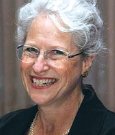Catherine H. Van Poznak, MD, Associate Professor of Medical Oncology at the University of Michigan, uses the skills she learned as a 2010–2011 participant in ASCO’s Leadership Development Program (LDP) to further the Society’s educational efforts through her service on the Professional Development Committee and Continuing Medical Education Subcommittee, among other activities. She discussed her educational experiences and expectations for the future of education with ASCO Connection.
How did you benefit from the Leadership Development Program?
The Leadership Development Program covered many different aspects of leadership and provided new and improved insights into coordinating efforts of a team. For example, the skills I learned in the conflict management session have helped me work more effectively within both clinical- and research-focused teams. The advocacy training was extremely valuable as well. Through an ASCO LDP trip to Capitol Hill, I learned about the interface between ASCO and policymaking. That experience gave me the skills I needed to be an ASCO representative during the One Voice Against Cancer’s advocacy day on Capitol Hill in July 2014, where we advocated for cancer research funding.
What impact do you want to have through education-related committee service?
I would like to broaden and deepen the scope of resources available to ASCO members to assist them in continuing education, Maintenance of Certification, and lifelong learning. ASCO offers top-notch educational symposia, publications, and diverse resources through ASCO University®. My hope is that members will be able to find solutions to all of their educational needs through ASCO and bolster their competency. This goal extends to every member, from our medical students to our emeritus members.
What educational gaps do you see oncology professionals facing?
There are gaps in various areas, but certainly the rapid changes in molecular testing have been profound. ASCO is already helping the membership understand the biologic mechanisms behind these pathways through its journals, ASCO University, and scientific meetings. In many cases, our understanding of the biology exceeds our ability to clinically act on this molecular information. Guidance on how to use therapies based on specific pathways and in specific clinical circumstances is an area where ASCO has an opportunity to fill a tremendous gap.
What are you looking forward to accomplishing in the near future?
I’m very excited about the potential of CancerLinQ™ (ASCO’s rapid learning system). This system will provide the ability to perform self-assessment and offer directed learning opportunities. I’m excited about the work of the Professional Development Committee on women’s professional development. We’re also assessing how subpopulations of members within ASCO may have unique educational needs and how to address them through our education and quality efforts.
How has volunteering added value to your membership experience?
Volunteering for ASCO committees is intellectually stimulating and emotionally satisfying. It’s an honor and a privilege to work with such dedicated colleagues to advance patient care. Through my volunteer activities, I’ve interacted with members from all practice settings, and the rich diversity broadens my own horizons. It’s a joy to volunteer, and I hope that all interested members will consider applying to serve on a committee.
For more information on the Leadership Development Program, Leadership Skills Seminar, and other educational opportunities available from ASCO, visit asco.org/professional-development. ■
Originally printed in ASCO Connection. © American Society of Clinical Oncology. “Expanding the Reach of ASCO’s Educational Efforts.” ASCO Connection, January 2015: 5. All rights reserved.


